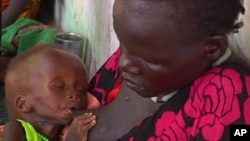The U.N. Food and Agriculture Organization is scaling-up and extending its emergency operations in South Sudan. However, humanitarian efforts are being slowed by heavy rains. FAO Special Adviser Marjolaine Greentree said conditions are going from bad to worse.
“The humanitarian situation in South Sudan is really very dire," she said. "And we have just a few days left before the end of the planting season for the crops. [At] the same time the rains have started very, very strongly and making the few roads quite impassable.”
With the roads washed out or too muddy to use, the FAO is using other means to deliver aid.
Greentree said, “We have gone from road convoys to airlifts – and now for some places you cannot even land. So we have gone to the last resort solution, which is organizing air drops. This is a first for FAO, by the way, but the conditions here are quite extreme.”
Airdrops are much more complex and expensive than airlifts. And special precautions need to be taken to ensure aid packages hit the ground in one piece, even seed packages.
“Usually when we do an airlift or we transport by truck the seeds are in one bag. In order to be sure that they would not explode on landing we had to wrap them six times,” she said.
Wrapping them in six bags instead of one, means aid deliveries take a lot more time to prepare and take up a lot more space on the plane.
The seeds are part of 110,000 emergency livelihood kits that contain not only crop and vegetable seeds, but farming tools, fishing gear and livestock health products. Those kits will support 1.3 million people.
Greentree said current efforts can help ensure South Sudanese simply have enough to eat.
“The food security situation is worsening. We have more than 3.5 million people who are currently suffering from crisis of all emergency levels of food insecurity. And that means they are not able to meet their basic survival needs.”
When that happens, there’s the risk people will use – what’s called – extreme coping measures. That is, they sell their property to buy food, including what seeds they may have along with farming tools. And they may also sell their livestock, which is of critical importance to livelihoods in South Sudan.
The FAO is scaling-up operations over the next three months, but it says it needs more funding. The U.N. agency has received $42million from donors, but needs $108 million to continue its Crisis Response Plan through next March. It said if it does receive full funding, the number of people it’s able to support could increase from 1.3 million to 2.7 million next year.
“The humanitarian situation in South Sudan is really very dire," she said. "And we have just a few days left before the end of the planting season for the crops. [At] the same time the rains have started very, very strongly and making the few roads quite impassable.”
With the roads washed out or too muddy to use, the FAO is using other means to deliver aid.
Greentree said, “We have gone from road convoys to airlifts – and now for some places you cannot even land. So we have gone to the last resort solution, which is organizing air drops. This is a first for FAO, by the way, but the conditions here are quite extreme.”
Airdrops are much more complex and expensive than airlifts. And special precautions need to be taken to ensure aid packages hit the ground in one piece, even seed packages.
“Usually when we do an airlift or we transport by truck the seeds are in one bag. In order to be sure that they would not explode on landing we had to wrap them six times,” she said.
Wrapping them in six bags instead of one, means aid deliveries take a lot more time to prepare and take up a lot more space on the plane.
The seeds are part of 110,000 emergency livelihood kits that contain not only crop and vegetable seeds, but farming tools, fishing gear and livestock health products. Those kits will support 1.3 million people.
Greentree said current efforts can help ensure South Sudanese simply have enough to eat.
“The food security situation is worsening. We have more than 3.5 million people who are currently suffering from crisis of all emergency levels of food insecurity. And that means they are not able to meet their basic survival needs.”
When that happens, there’s the risk people will use – what’s called – extreme coping measures. That is, they sell their property to buy food, including what seeds they may have along with farming tools. And they may also sell their livestock, which is of critical importance to livelihoods in South Sudan.
The FAO is scaling-up operations over the next three months, but it says it needs more funding. The U.N. agency has received $42million from donors, but needs $108 million to continue its Crisis Response Plan through next March. It said if it does receive full funding, the number of people it’s able to support could increase from 1.3 million to 2.7 million next year.





